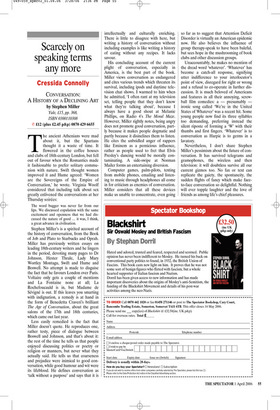Scarcely on speaking terms any more
Cressida Connolly
CONVERSATION: A HISTORY OF A DECLINING ART by Stephen Miller Yale, £15, pp. 368, ISBN 0300110308 ✆ £12 (plus £2.45 p&p) 0870 429 6655 The ancient Athenians were mad about it, but the Spartans thought it a waste of time. It flowered in the coffee houses and clubs of 18th-century London, but fell out of favour when the Romantics made it fashionable to prefer solitary communion with nature. Swift thought women improved it and Hume agreed: ‘Women are the Sovereigns of the Empire of Conversation,’ he wrote. Virginia Woolf considered that including talk about sex greatly enlivened the conversations at her Thursday soirées:
The word bugger was never far from our lips. We discussed copulation with the same excitement and openness that we had discussed the nature of good ... it was, I think, a great advance in civilisation.
Stephen Miller’s is a spirited account of the history of conversation, from the Book of Job and Plato to Starbucks and Oprah. Miller has previously written essays on leading 18th-century writers and he lingers in the period, devoting many pages to Dr Johnson, Hester Thrale, Lady Mary Wortley Montagu, Swift and Hume and Boswell. No attempt is made to disguise the fact that he favours London over Paris. Voltaire only gets a couple of mentions and La Fontaine none at all; La Rochefoucauld is in, but Madame de Sévigné is out. If this leaves you smarting with indignation, a remedy is at hand in the form of Benedetta Craveri’s brilliant The Age of Conversation, about the great salons of the 17th and 18th centuries, which came out last year.
Less easily remedied is the fact that Miller doesn’t quote. He reproduces one, rather testy, piece of dialogue between Boswell and Johnson, and that’s about it: the rest of the time he tells us that people enjoyed discussing politics or poetry or religion or manners, but never what they actually said. He tells us that coarseness and prejudice were inimical to good conversation, while good humour and wit were its lifeblood. He defines conversation as ‘talk without a purpose’ and says that it is intellectually and culturally enriching. There is little to disagree with here, but writing a history of conversation without including examples is like writing a history of eating without any recipes. It lacks savour.
His concluding account of the current plight of conversation, especially in America, is the best part of the book. Miller views conversation as endangered and cites various trends which threaten its survival, including ipods and daytime television chat shows. I warmed to him when he admitted, ‘I often rant at my television set, telling people that they don’t know what they’re talking about’, because I always have a good shout at Melanie Phillips, on Radio 4’s The Moral Maze. However, Miller rightly notes, being angry does not promote good conversation, partly because it makes people dogmatic and partly because it disinclines them to listen. He cites the unbridled anger of rappers like Eminem as a pernicious influence, rather as people used to fret that Elvis Presley’s dancing would be morally contaminating. A side-swipe at Norman Mailer forms an entertaining diversion.
Computer games, palm-pilots, texting from mobile phones, emailing and listening to music through headphones all come in for criticism as enemies of conversation. Miller considers that all these devices make us unable to concentrate, even going so far as to suggest that Attention Deficit Disorder is virtually an American epidemic now. He also believes the influence of group therapy-speak to have been baleful, but sees hope in the mushrooming of book clubs and other discussion groups.
Unaccountably, he makes no mention of the dread word ‘whatever’. ‘Whatever’ has become a catch-all response, signifying utter indifference to your interlocutor’s point of view, disregard for right or wrong and a refusal to co-operate in further discussion. It is much beloved of Americans and features in all their annoying, screwball film comedies: a — presumably ironic song called ‘We’re in the United States of Whatever’ was a recent hit. Some young people now find its three syllables too demanding, preferring instead the silent riposte of forming a ‘W’ with their thumbs and first fingers. ‘Whatever’ is to conversation as Harpic is to germs in a lavatory.
Nevertheless, I don’t share Stephen Miller’s pessimism about the future of conversation. It has survived telegrams and gramophones, the wireless and then television: it will doubtless survive all our current gizmos too. No fax or text can replicate the gaiety, the spontaneity, the sudden flights of fancy which make faceto-face conversation so delightful. Nothing will ever topple laughter and the love of friends as among life’s chief pleasures.


























































































 Previous page
Previous page